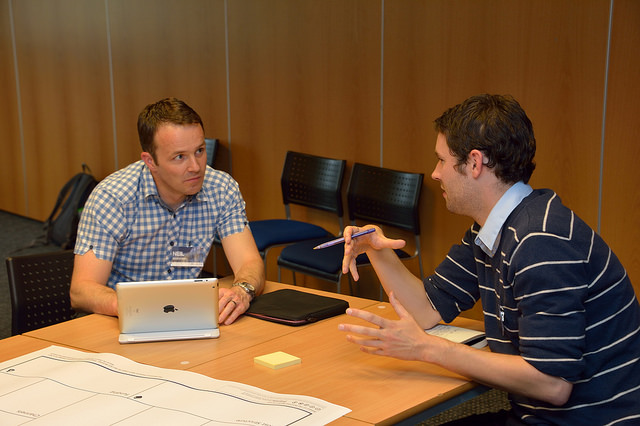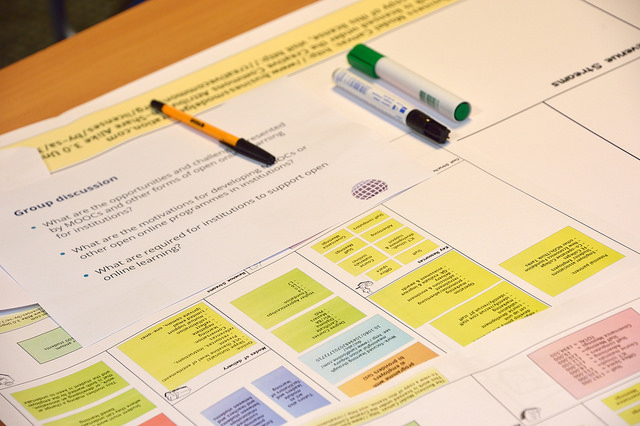Learning Analytics Community Exchange (LACE) Project
January 2014

The Learning Analytics Community Exchange is an EU project in the 7th Framework Programme involving nine partners across Europe which started in 2014. LACE partners are passionate about the opportunities afforded by current and future views of learning analytics (LA) and educational data mining (EDM) but are concerned about missed opportunities, undesirable consequences of mis-application,
investment funding failing to realise value, market failure, etc. The 30 month project aims to integrate
disparate communities working on LA and EDM from the schools, workplace, and universities sectors, by sharing viable and effective solutions to real problems through creation of an evidence base, publishing white papers and running workshops and events.
Area:
Strategic Advice
Contact: Adam Cooper
More information: LACE Project
LRMI (Learning Resource Metadata Initiative)
January – October 2014
In early 2014 Cetis was commissioned by Creative Commons to help manage the third phase of the Learning Resource Metadata Initiative project (LRMI). The initiative, which builds on the work of Schema.org, aims to support the discovery of relevant education resources on the web. LMRI is funded by the Bill & Melinda Gates Foundation, and jointly lead by Creative Commons and the Association of American Publishers with the aim of making it easier to publish, discover, and deliver high quality educational resources on the web. With input from a wide range of organisations, from both the open and commercial spheres, involved in publishing and using educational resource LRMI successfully proposed additions to schema.org (an initiative of Google, Yahoo and Bing) allowing the description of educationally important properties of resources to be marked-up in web pages in a manner that is easily understood by search engines. This enables people to create search engines that support the filtering search results based on criteria such as their match to a specific part of a curriculum, or the age of the students, or one of several other characteristics.
Key area: Standards
Key contact: Phil Barker
More information: http://www.lrmi.net/
Assessment standards QTI
Since 2001
Managing assessment is a key concern for educational organisations. There is an obvious role for technology to play in this. Over the last ten years Cetis has worked with IMS and the community in the development of the Question and Test Interoperability specification. We have also worked with Jisc to ensure its wide adoption by the community in particular through supporting the development of specialised tools and services which implement the specification.
Area: Standards development
Contact: Wilbert Kraan
More information: IMS Question and Test Interoperability v2.1 briefing paper
Key Outputs: http://www.imsglobal.org/question/
Course data interoperability (XCRI)
Since 2004
Since 2004 Cetis has worked with early adopters from the UK higher and further education sector to develop a specification for course data. The course advertising specification XCRI-Cap has now become a European and British Standard, Metadata for Learning Opportunities. Last year we estimated that HE institutions could save between £1.5m to £2.8m per year on data re-keying and spend it on higher-value marketing activity.
Area: Standards Development
Contact: Scott Wilson
More Information: http://www.xcri.co.uk/
Timeline: XCRI timeline
Support for the HE Academy / JISC UK Open Educational Resources Programme
2009-2012
Cetis has a long history of supporting the open educational resource movement to make a significant volume of existing teaching and learning resources freely available online. We provided strategic advice and support for all technical aspects of the recent HE Academy/JISC OER programmes.
The technical directions supported by this work covered resource management and description, licensing and attribution, search engine optimisation and discovery, tracking OERs, and paradata–activity data about learning resources. This work has had a significant impact on the global OER movement, including contributing to the work of Creative Commons, MIT, the UK Open University, US Department of Education.
Area: Strategic advice and support
Contact: Lorna M. Campbell and Phil Barker
More information: http://wiki.cetis.ac.uk/Oer
Key Outputs: Into the Wild – Technology for Open Educational Resources, Events http://wiki.cetis.ac.uk/CETIS_OER_events
Timeline: OER timeline

Leap2A portfolio portability specification
2007-2010
Cetis has played a pivotal role in developing a specification to enable portability of data between portfolio systems. Leap2A is an open specification for transferring learner-owned information between different systems. The portfolio community now has an effective de facto standard which is implemented in widely adopted e-portfolio systems such as Mahara, PebblePad, ePet and MyProgressFile which together represent half of the UK market.
Area: Standards Development
Contact: Simon Grant
More information: http://cetis.org.uk/leap2/a/
Events: http://jisc.cetis.ac.uk//view/events/Portfolio
Support for the Distributed Virtual Learning Environments Programme
2010-2011
Over the past decade virtual learning environments have become a ubiquitous part of HE learning and teaching provision. Cetis has been at the forefront of leading discussions into extending the capabilities of learning environments, reconceptualising them to include personal learning environments (PLE) and distributed learning environments.
In early 2010 we published the Distributed Learning Environments Briefing paper outlining a number of potential technical models and approaches for extending VLE functionality. These models drew on a number approaches including use of emerging standards such as IMS LTI, W3C widgets, and web services. The Cetis team helped shape and support the Jisc Distributed Virtual Learning Environments programme to explore these models.
Areas: Strategic advice and support
More information: http://wiki.cetis.ac.uk/DVLE_Support
Key Outputs: DVLE Briefing Paper, LTI Briefing paper.
Timeline: Learning Environments Timeline
HEDIIP New Subject Coding Project
June 2014
Subject coding is one of the key building blocks of student data that ought to have sector-wide and consistent applicability. The current method of classifying subjects is based on a scheme known as the Joint Academic Coding System (JACS). JACS has been in use for a number of years and now requires a major review.
Cetis is undertaking a project to develop a replacement for the JACS system which meets the needs of a broader group of stakeholders and reflects the diverse and dynamic nature of higher education in the twenty-first century. This builds on the JACS report published in 2013 which considered the varying requirements and uses of subject coding in HE and sets out options for the development of a replacement for JACS.
Area: Strategic Advice
Contact: Adam Cooper/Wilbert Kraan
More information: http://www.hediip.ac.uk/subject_coding/
http://subjectcoding.wordpress.com/
Scottish FE Sector Management Information Systems Integration Options
November 2013 – February 2014
Cetis was commissioned to undertake technical modelling work of the role of existing and currently developing Management Information Systems (MIS) deployments and to consider alternative future deployments, together with their advantages and disadvantages. This work identified existing and alternative models of operation, including a central software service given the changing context as Scottish FE transitions from 41 institutions to 15 regional colleges through a number of mergers and federations. The methodology developed was based the Enterprise Architecture approach to help businesses and educational organisations develop more efficient IT systems and processes.
Area: Strategic Advice
Contact: Stephen Powell and Bill Olivier
MOOC (Massively Open Online Course) Data Analytics for University of Edinburgh
2013-2014
This involved work on “Big Data” from six Coursera MOOCs delivered by the University of Edinburgh, working with their Distance Education Initiative in the Vice-Principal’s Office.
Area: Strategic Advice
Contact: Adam Cooper
More information:http://moocs.is.ed.ac.uk/acknowledgements/
Analytics Series
November 2012
Cetis is actively exploring the potential for analytical and data driven approaches to key areas in education such as teaching and learning, research and administration. We have produced the Cetis Analytics Series which explores the potential insights and strategic advantages that analytics and data driven approaches can bring to the education sector.
Area: Strategic Advice
Contact: Adam Cooper
More information: http://jisc.cetis.ac.uk/topic/analytics
Key Outputs: Cetis Analytics Series

Relationship Management Programme
2009-2012
Jisc and Cetis have been working together to help higher and further education institutions consider ways of improving their relationship management processes. Two phases of work have focused on Business and Community Engagement Customer Relationship Management and Student Lifecycle Relationship Management. The second phase of projects have recently finished and a Compendium of Good Practice has just been produced based on their experiences. This work closely aligns with our current work on Analytics.
Area: Strategic advice and support
Contact: Paul Hollins
More Information: http://jisc.cetis.ac.uk/support/relationship-management
Key Outputs: Service Design briefing paper, Relationship Management InfoKit
Enterprise Architecture and the Archi tool
2008-2011

Enterprise Architecture approaches can help businesses and educational organisations to develop more efficient IT systems and processes.
The Archi tool, funded by Jisc, was developed as a way to show that the ArchiMate specification used by Enterprise Architects could be implemented in a simple modelling tool to help novices pick up the ArchiMate language quickly and easily. Archi has had a significant impact on the market for Enterprise Architecture tools. It is now an established open source alternative to commercial tools. We introduced the tool and the approach to a variety of UK D HE providers at a series of Enterprise Architecture events.
Areas: Standards development, Strategic advice
Contact: Wilbert Kraan
More information: http://archi.cetis.ac.uk/
Key outputs: The Archi tool coupled with the training we provided has established an enterprise architecture capacity in the sector which was non-existent in 2008.
TELMap – Trends in Technology Enhanced Learning
2010-2012
TEL-Map is a Coordination and Support Action funded by the European Commission under the Technology-Enhanced Learning programme. It supports the programme by exploring trends in, and plausible future forms of, technology enhanced learning. This is done by analysing socio-economic factors, surveying technology adoption, building scenarios and conducting road-mapping activities with stakeholder groups. Our focus has been on scenario-building and road-mapping with stakeholder groups and text mining blog posts for evidence of wider interest.
Areas: Future Trends
Key Staff: Bill Olivier, Adam Cooper and Li Yuan
More information: http://www.telmap.org/

Cetis’s work around open standards, open education around interoperability are more critical now than at any other time. We’re seeing, as a country, increasing access to open data, increasing use of data and also an increasing number of issues arising from the use and scrutiny of data. So Cetis is a critical organisation at this point in time.
Josie Fraser, ICT Strategy Lead (Children’s Capital) at Leicester City Council






